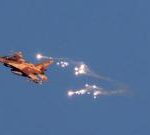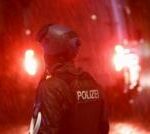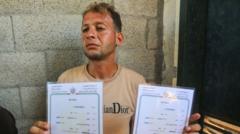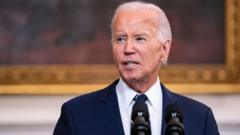Israel says its warplanes have struck Hezbollah targets in Lebanon after detecting moves to launch an aerial attack on Israel.
The Israeli military said around 100 fighter jets had destroyed “thousands” of rocket launchers on Sunday morning, in what it described as an act of “self-defence”. Lebanon’s health ministry reported that three people had been killed.
Hezbollah later said it had fired hundreds of rockets towards northern Israel, calling it “phase one” of a multi-stage attack in retaliation for the killing of a senior commander. No casualties have been reported in Israel.
The exchange marks a major escalation of tensions between Israel and the Iran-backed Shia Muslim armed group.
There have been almost daily exchanges of fire across the Israel-Lebanon border since the day after the start of the war between Israel and Hamas in Gaza on 7 October.
Hezbollah has said it is acting in support of the Palestinian group that is also backed by Iran. Both groups are proscribed as terrorist organisations by Israel, the UK and other countries.
So far, more than 560 people have been reported killed by Lebanon’s health ministry, the vast majority of them Hezbollah fighters, while 26 civilians and 23 soldiers have been killed in Israel, according to authorities.
The UN says almost 200,000 people have also been displaced on both sides of the border.
The Israel Defence Forces (IDF) said in a statement early on Sunday that it had identified “extensive preparations” for a large-scale aerial attack by Hezbollah, which had prompted it to launch the pre-emptive strikes.
It added that its planes had struck over 40 launch areas, some of which it said were aimed towards central Israel.
Prime Minister Benjamin Netanyahu said Israeli forces were “determined to do everything possible to defend our country” and return tens of thousands of residents of northern Israel who have been displaced by the conflict.
“Whoever harms us – we will harm them,” he added.
Foreign Minister Israel Katz said Israel was “acting to protect its citizens and territory” and “does not seek all-out war” in the Middle East.
Israel said Lebanese civilians had been warned to immediately leave areas where Hezbollah was operating.
Lebanon’s ministry of public health said three people had been killed in Israeli strikes in the south of the country.
The ministry said one person was killed in a drone strike on a car in Khiam. Hezbollah announced the death of a fighter from the allied Shia Amal movement in the village.
The ministry also said an Israeli attack on the village of Tayri had killed two people, without providing further details.
Shortly after the Israeli strikes, Hezbollah said it had launched 320 Katyusha rockets aimed at 11 Israeli military bases and barracks.
It claimed the barrage had “completed and accomplished” its initial response to last month’s killing of one of the group’s senior military commanders, Fuad Shukr, in an Israeli strike in Lebanon’s capital, Beirut. Israel had blamed Shukr for the killing of 12 children in a rocket attack in the occupied Golan Heights.
Hezbollah also dismissed as “empty” the Israeli military’s statement that its strikes on Sunday had thwarted a larger attack.
The group’s leader, Hassan Nasrallah, is scheduled to give a speech later on Sunday.
The escalation has happened as efforts continue for a ceasefire and hostage release deal in Gaza – the main hope to de-escalate tensions along the Israel-Lebanon border.








